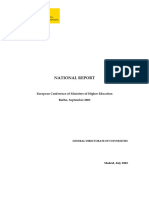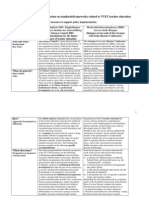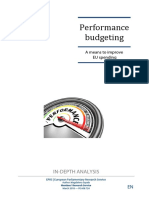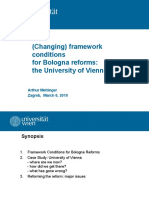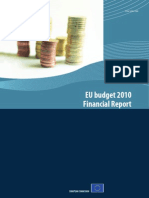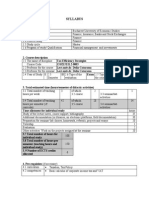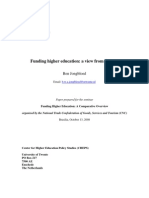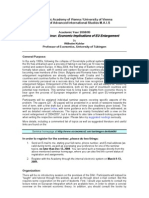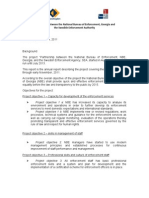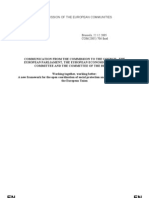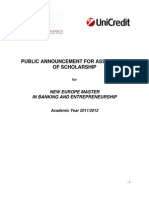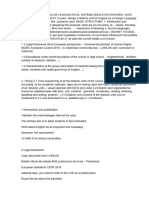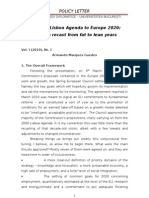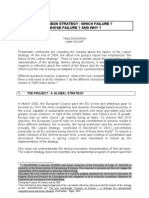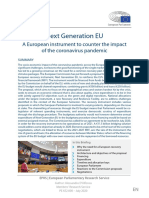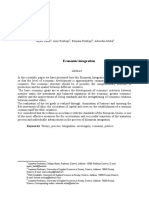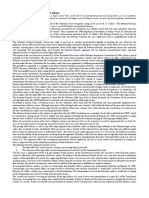Budgetary and Taxation Law
Budgetary and Taxation Law
Uploaded by
Gezim Sh JakupiCopyright:
Available Formats
Budgetary and Taxation Law
Budgetary and Taxation Law
Uploaded by
Gezim Sh JakupiOriginal Description:
Copyright
Available Formats
Share this document
Did you find this document useful?
Is this content inappropriate?
Copyright:
Available Formats
Budgetary and Taxation Law
Budgetary and Taxation Law
Uploaded by
Gezim Sh JakupiCopyright:
Available Formats
Master Studies Development Form Annex 1
ANNEX 1: MODULES AND COURSES
MASTER STUDIES DEVELOPMENT FORM
Please complete this form carefully on a computer
EU-LER Legal Education System Reform
An EU funded project managed by the European Commission Liaison Office to Kosovo
Component B
Master Studies Development Form Annex 1
1.1
MODULE
ANNEX 1: MODULES AND COURSES
Please copy and fill in annex 1 for each module separately, and copy the necessary number of courses per module
DESCRIPTION
Module number and
title
Course number and title
B) 1
No. of
teaching
hours
2
No. of
ECTS
Semester
1st
2nd
B) Budgetary and
taxation law
Objectives (Competences):
EU-LER Legal Education System Reform
An EU funded project managed by the European Commission Liaison Office to Kosovo
Component B
Name and function of lecturer
Dr. Sc. Bedri PECI, Associate
Professor
Master Studies Development Form Annex 1
This course explores the complexity of budgetary and taxation law. First, the course through introduction provides an overview of the fundamental
principles of budgetary and taxation law. Second, an examination of the revenue side of budget with particular view on direct and indirect taxes. A
third major focus of the course is the expenditure side of the budget and budgetary process, respectively the roles of each of the major
actors/institutions (the agency, the executive, the legislature, and interest groups) in budget making process. Important topics in budgetary control
are examined. Budgetary law of EU will be presented from a historical and evolutionary perspective. In the end will be examined budgetary and tax
law in Kosovo and some other emergent issue related to it.
EU-LER Legal Education System Reform
An EU funded project managed by the European Commission Liaison Office to Kosovo
Component B
Master Studies Development Form Annex 1
1.2 COURSE SYLLABUS
Course Syllabus
Course Title: International Aspects of
Taxation
Course is
Explain relation between teaching hours
and ECTS credits:
modified
Course Date:
(semester and dates if already known):
Lecturers name:
Office location:
Lecturer:
new
Dr. Sc. Bedri PECI, Prof. Asc.
Law Faculty, University of Pristine
Office hours:
Phone:
+377 (044) 599 023
email address:
bedriipeci@hotmail.com
Course Type
(e.g. seminar, lecture, lab sessions, etc.)
lecture
Format
(e.g. once per week, block course, etc.
specify number of course sessions)
Once per week
Introductory
Deepening
Level
Course Description (content):
Specializing
The module begins with introduce to
budgetary and tax law in general, and
follows with the revenue side of budget,
with particular view on direct and indirect
taxes.
Certain emphasis is given to budgetary
procedure, respectively to budget cycles
such as budget preparation, role of
EU-LER Legal Education System Reform
An EU funded project managed by the European Commission Liaison Office to Kosovo
Component B
Master Studies Development Form Annex 1
parliament in budgetary procedure, budget
approval budget execution and to budget
control.
The next part of module focuses on
examination in general of budgetary law of
EU.
The module winds up with analysis of
budgetary and tax law in Kosovo and some
emerging issue.
Examination Modalities:
Learning Outcomes:
(show how course contributes to objectives
of the module)
20%: Participation in class discussion.
20%: Over the course of the semester, we
will cover several problem sets. Each
student will be responsible for preparing
and presenting one problem set over the
course of the semester. The student will
write a three- to five-page paper (doublespaced, 12-point Times New Roman font, 1
margins) analyzing the problems.
The student will have 10-15 minutes during
class to walk the class through the problem
set and answer questions. This assignment
will represent 20% of each students grade.
60%: Exam. I will give you more information
about the exam toward the end of the
semester.
By the end of the course, students should
be able to:
-Explain the underlying fundamental
principles of budgetary and taxation law;
-Analyze and evaluate revenue sources on
appropriate evaluative criteria;
-Understand how the budgetary process
works including the effects of the politics of
the budgetary process on budget outcomes,
and understand the importance of
accounting and financial reporting for the
budgetary process;
-Utilize budget analysis techniques to
evaluate budget trends, explain budget
changes, assess budget justifications, and
determine the correspondence of budgetary
decision-making with managerial goals and
objectives consistent with organizational
mission and strategic planning ;
- Explain the underlying fundamental
principles of budgetary and taxation law in
Kosovo and compare with theory and
practice.
EU-LER Legal Education System Reform
An EU funded project managed by the European Commission Liaison Office to Kosovo
Component B
Master Studies Development Form Annex 1
Instructional Methods:
Place statement about how course is taught.
Required/
recommended
Literature
(include
publication
details)
Following an introductory two hour lecture,
teaching on the module will be conducted
by means of a weekly series of one-hour
lectures followed by one hour seminars. A
list of reading materials and questions for
seminars will be distributed in advance and
students will be expected to prepare
answers for discussion in seminars.
Required book(s)
Legislative Oversight and Budgeting:
A World Perspective, (WBI
Development Studies) Rick
Stapenhurst (Author, Editor),
Riccardo Pelizzo (Editor), David M.
Olson (Editor), Lisa Von Trapp
(Editor), World Bank Publications,
2008;
Ian Lienert, Role of the Legislature
in Budget Processes, IMF. WP.2010;
Rita de la Feria, The EU VAT System
and the Internal Market, IBFD, 2009;
Joachim Wehner, Legislatures and
the Budget Process; the Myth of
Fiscal Control, Palgrave Macmillan,
2010;
Bedri Peci, Classification of taxes the
case of OECD, The Law- Journal for
juridical and social issues, No. 1/2005,
Publisher-Law school of University of
Pristine;
Recommended book(s)
Robert D. Lee, Philip G. Jovce,
Public Budgeting Systems, Jones and
Bartlett; 8 edition (July 31, 2007);
- Ben Terra, Peter Wattel, European
Tax Law, third edition, Kluwer Law
International, 2001;
- A. Prechmand, Government
budgeting and expenditure controls:
theory and practice, IMF 1984;
- Hervoje Simovic, Proracun europske
unije, WP. FTP No.3/2005,
IJF,Zagreb, 2005.
-Mark Hallerberg ,Carlos
Scartascini ,Ernesto Stein, Who Decides the
Budget? (David Rockefeller/Inter-American
Development Bank), David Rockefeller
Center for Latin American Studies, Harvard
University/Inter-American Development
EU-LER Legal Education System Reform
An EU funded project managed by the European Commission Liaison Office to Kosovo
Component B
Master Studies Development Form Annex 1
Bank, 2009;
-Greg G. Chen , Dall W. Forsythe, Lynne A.
Weikart, Daniel W. Williams, Budget Tools:
Financial Methods in the Public Sector, CQ
Press; 1st edition (March 25, 2008);
- Carol W. Lewis, W. Bartley Hildreth,
Budgeting: Politics and Power, Oxford
University Press, USA; 1 edition, 2010;
-David Nice, Public Budgeting, Wadsworth
Publishing; 1 edition, 2001;
-C. Hyde, Government budgeting: theory,
process, and politics, Wadsworth Publishing;
3 edition, 2001;
-Martin Burke, Taxation of Individual
income, LexisNexis/Matthew Bender; 8th
Ed. 2007 edition, 2007.
1. Bedri Peci, -Harmonization of taxes in
the function of promoting the common
market of European Union The LawJournal for juridical and social issues,
No. 2-/2010, Publisher-Law school of
University of Pristine.
2. Bedri Peci, - Neke Karakteristike
Sistema i Poreske Politike Kosova:
Tradicija i Izazovi (Godine 1945-2008),
Godisnjak Pravnog Fakulteta 2009,
University of Sarajevo, Sarajev 2009,
fq.269-299
3. Bedri Peci, The role of the parliament
for the increase transparency of
budgetary procedures in the budgetary
theory and practice the case of
Kosovo, The Law Journal for juridical
and social issues, No. 1/2006, PublisherLaw school of University of Pristine.
4. Bedri
Peci,
The
structure
of
Contemporary tax systems-the case of
Kosovo, Dardania Sacra 3 - Scientific
review of social,
economic
and
technological issues of Kosovo, Pristine
2001.
5. Bedri Peci, Development of budget and
budgetary system of Croatia at the
transition phase, The Law- Journal for
juridical and social issues, No. 2-4/2005,
Publisher-Law school of University of
Pristine.
6. Bedri Peci, Kosovos tax system
traditions and challenges, Kosovo &
Balkan Observer No.1/2001,PublisherKosovo Action for Civil Initiative KACI,
Pristine.
7. OECD Journal on Budgeting
8. Public Budgeting and Finance
EU-LER Legal Education System Reform
An EU funded project managed by the European Commission Liaison Office to Kosovo
Component B
Journals or other material
Master Studies Development Form Annex 1
9. Finance in Theory and Practice
10. World Tax Journal
11. European Taxation
12. EC Tax Review
13. EC Tax Journal
Topics and Assignments
Add adequate
number of
sessions
Session 1
Session 2
Session 3
Major topics/themes
Introduce to budgetary and taxation
law
The revenue side of budget (revenue
sources)
Direct taxes
Indirect taxes (Value Added Tax,
excises)
The expenditure side of the budget
Session 4
Session 5
Session 6
Session 7
Budget Cycles
Budget preparation: Decision process
Budget Approval: the role of
legislature
Session 8
Budget execution and control
Session 9
Session 10
Budgetary and tax law of EU
Budgetary and taxation law in Kosovo
Session 11
Readings/assignments
PBS, chapter 1
PBS, chapter 4
ETL, Chapter 4, pp. 239-298
CTCO.No. 1/2005
ETL chapter 6 &7
GBECTHP, chapter 2, 7 and 9
PBS, chapter 3
GBECTHP, chapter 4
LOBWP, 49-110
LBPMVC, pp.1-140
RLBP,pp.1-20
GBECTHP, Chapter 5 and 12
PEU, pp. 299-315
ETL chapter 3,4 and 5
Laws on budgets and different
taxes, relevant journals
mentioned above.
EU-LER Legal Education System Reform
An EU funded project managed by the European Commission Liaison Office to Kosovo
Component B
You might also like
- Intellectual Property IDocument12 pagesIntellectual Property INasifa Zawedde0% (1)
- 15-0564 - March Summary Report FINALDocument48 pages15-0564 - March Summary Report FINALTodd FeurerNo ratings yet
- National Report Spain 2003 576430Document13 pagesNational Report Spain 2003 576430Ap YtNo ratings yet
- Brochure WiiwDocument3 pagesBrochure WiiwIrena LesovskaNo ratings yet
- EPSAS Progress Report 2019Document9 pagesEPSAS Progress Report 2019Helen ConJotaNo ratings yet
- Tempus GuidelinesDocument69 pagesTempus GuidelinesNerimana SmajicNo ratings yet
- Between Success and Unsuccess in Absorbing Eu Funds - Poland vs. RomaniaDocument12 pagesBetween Success and Unsuccess in Absorbing Eu Funds - Poland vs. RomaniaAnonymous p52JDZOdNo ratings yet
- 5th Bologna Report - EaP CSFDocument23 pages5th Bologna Report - EaP CSFEaP CSFNo ratings yet
- Tempus IV: Reform of Higher Education Through International University CooperationDocument66 pagesTempus IV: Reform of Higher Education Through International University CooperationndjedouiNo ratings yet
- Green PaperDocument18 pagesGreen Papervaria5No ratings yet
- Higher Education in Kosovo: Under UNSCR 1244/1999Document11 pagesHigher Education in Kosovo: Under UNSCR 1244/1999Salmir MustafiNo ratings yet
- Berlin Communique 1Document9 pagesBerlin Communique 1Haj Cezar MihaiNo ratings yet
- Template For Preparation by Member States of The: E R I A - E R FDocument47 pagesTemplate For Preparation by Member States of The: E R I A - E R FMyo Myat Thi Da WinnNo ratings yet
- Catalogue of Courses Held in English: Law SchoolDocument8 pagesCatalogue of Courses Held in English: Law SchoolAnonymous KHQBqn1qNo ratings yet
- EuroPsy 2021 enDocument81 pagesEuroPsy 2021 enMartynas GriesiusNo ratings yet
- Chapter 3: Erasmus Programme: 3.1: Bologna Process and ECTSDocument13 pagesChapter 3: Erasmus Programme: 3.1: Bologna Process and ECTSLaur GoeNo ratings yet
- Germany TVETDocument11 pagesGermany TVETGhazally FaridahNo ratings yet
- Ukraine AP2003Document9 pagesUkraine AP2003Alfonso VelayosNo ratings yet
- Performance Budgeting: In-Depth AnalysisDocument40 pagesPerformance Budgeting: In-Depth AnalysiscamirandamNo ratings yet
- 5th Call Application Guidelines enDocument64 pages5th Call Application Guidelines enHassan AhansalNo ratings yet
- Benchmarking MECHANISM in Kosovo GLPSDocument18 pagesBenchmarking MECHANISM in Kosovo GLPSStanciu AlinaNo ratings yet
- Memo CC 26.04.2018 Final ENDocument5 pagesMemo CC 26.04.2018 Final ENEaP CSFNo ratings yet
- Ipa II 2015 031-609.03 MC Coe FacilityDocument18 pagesIpa II 2015 031-609.03 MC Coe FacilityMila BoskovicNo ratings yet
- Com2011 0413en01Document12 pagesCom2011 0413en01Nutmath EerubtubNo ratings yet
- Arthur Mettinger, University of Vienna, Austria " (Changing) Framework Conditions For Bologna Reforms: The University of Vienna Case"Document25 pagesArthur Mettinger, University of Vienna, Austria " (Changing) Framework Conditions For Bologna Reforms: The University of Vienna Case"PentachoronNo ratings yet
- Guide To The Diploma Supplement UKDocument55 pagesGuide To The Diploma Supplement UKMarek KrólNo ratings yet
- EU Budget 2010 Financial ReportDocument92 pagesEU Budget 2010 Financial ReportUğur ÖzkanNo ratings yet
- Final Euscheme RopDocument19 pagesFinal Euscheme RopDanijelNo ratings yet
- SyllabusDocument5 pagesSyllabusSilvia Daniela RochianuNo ratings yet
- Ben Jongbloed - Funding Higher Education - A View From EuropeDocument30 pagesBen Jongbloed - Funding Higher Education - A View From EuropeMarcell NémethNo ratings yet
- A Us HangDocument2 pagesA Us HangJohnnyonlineNo ratings yet
- Annual Report 2011Document15 pagesAnnual Report 2011nbegeoNo ratings yet
- Account PayrollDocument10 pagesAccount PayrollSai ManikandanNo ratings yet
- Implementation of "Education and Training 2010" Work ProgrammeDocument22 pagesImplementation of "Education and Training 2010" Work ProgrammeMarisa Teixo CardosoNo ratings yet
- Social Inclusion FrameworkDocument10 pagesSocial Inclusion FrameworkAda C.No ratings yet
- 1.a Read The Following Article About Changes in Ukrainian Higher Education and Do The Tasks That FollowDocument12 pages1.a Read The Following Article About Changes in Ukrainian Higher Education and Do The Tasks That FollowМари АльмэNo ratings yet
- Institutional Aspects of EU Financial and Monetary Law and RegulationDocument3 pagesInstitutional Aspects of EU Financial and Monetary Law and RegulationsharonforeverythingelseNo ratings yet
- Concretefuturobjectiv Oth Enl t02Document25 pagesConcretefuturobjectiv Oth Enl t02cristina2908No ratings yet
- Schmitz, Agreement On ResultsDocument7 pagesSchmitz, Agreement On ResultsWytalikNo ratings yet
- Public Announcement For Assignment of Scholarship: New Europe Master in Banking and EntrepreneurshipDocument6 pagesPublic Announcement For Assignment of Scholarship: New Europe Master in Banking and EntrepreneurshipwwsuplierNo ratings yet
- Bologna Plan and TranslationDocument24 pagesBologna Plan and TranslationLeticia de la PazNo ratings yet
- Programacion IsabelDocument3 pagesProgramacion IsabelCrystal EnglandNo ratings yet
- Legal Aspects of The Implementation of EU Funds 2007-2013 in Poland - Practice and ChallengesDocument9 pagesLegal Aspects of The Implementation of EU Funds 2007-2013 in Poland - Practice and ChallengesIda MusialkowskaNo ratings yet
- Current Issues in Evaluating Structural Reforms Within The Lisbon ProcessDocument4 pagesCurrent Issues in Evaluating Structural Reforms Within The Lisbon ProcessBruegelNo ratings yet
- From The Lisbon Agenda To Europe 2020: A Dream Recast From Fat To Lean YearsDocument8 pagesFrom The Lisbon Agenda To Europe 2020: A Dream Recast From Fat To Lean YearsmicasilucaNo ratings yet
- The Lisbon StrategyDocument10 pagesThe Lisbon StrategyNiko AvramNo ratings yet
- Guia MacerattaDocument108 pagesGuia MacerattaAlberto Montero RosadoNo ratings yet
- Acc 418Document379 pagesAcc 418sigirya100% (2)
- EuroPsy Regulations December 2009Document66 pagesEuroPsy Regulations December 2009DanielaGuedesNo ratings yet
- Lisbon Strategy TZKHDocument22 pagesLisbon Strategy TZKHraist17No ratings yet
- Eprs Bri (2020) 652000 enDocument12 pagesEprs Bri (2020) 652000 enJohnny BoydNo ratings yet
- Accounting Rules For The European Communities A Theoretical AnalysisDocument34 pagesAccounting Rules For The European Communities A Theoretical AnalysisPrince McGershonNo ratings yet
- 6th (Final) Bologna Report - EaP CSF - ENDocument24 pages6th (Final) Bologna Report - EaP CSF - ENEaP CSFNo ratings yet
- Core Syllabus Oct2011 Final AaeDocument11 pagesCore Syllabus Oct2011 Final AaeLuis MoreyraNo ratings yet
- 4th Call Application Guideline-V2 enDocument69 pages4th Call Application Guideline-V2 enSrdjan StojiljkovicNo ratings yet
- Intermediate Course Study Material: TaxationDocument34 pagesIntermediate Course Study Material: TaxationMd IbrarNo ratings yet
- Project Cycle Management-2021-2027-SummaryDocument5 pagesProject Cycle Management-2021-2027-SummaryCecilio LopezNo ratings yet
- EPO - Training Overview - 06 03 12-FinalDocument72 pagesEPO - Training Overview - 06 03 12-FinalJussara FerreiraNo ratings yet
- Economic Integration: Keywords: Theory, Process, Integration, Sovereignty, Economy, PoliticsDocument8 pagesEconomic Integration: Keywords: Theory, Process, Integration, Sovereignty, Economy, PoliticsNijazi HaliliNo ratings yet
- Oslo Report Final 2006Document94 pagesOslo Report Final 2006Hummels1000No ratings yet
- City Council Agenda Oct. 7, 2013Document235 pagesCity Council Agenda Oct. 7, 2013NewzjunkyNo ratings yet
- 2023 BCPC 166Document9 pages2023 BCPC 166Corey Jay ParkerNo ratings yet
- Notes: A.M. No. 19-10-20-SCDocument88 pagesNotes: A.M. No. 19-10-20-SCVal CortesNo ratings yet
- SulhDocument17 pagesSulhSyazanaNo ratings yet
- GD Topic - Capital Punishment For RapistsDocument7 pagesGD Topic - Capital Punishment For RapistsjoysinhaNo ratings yet
- Abu Dhabi Real Estate GuideDocument16 pagesAbu Dhabi Real Estate Guidemoustafagad92No ratings yet
- Facts:: Granger Associates C. Microwave, 189 SCRA 631 (1990)Document3 pagesFacts:: Granger Associates C. Microwave, 189 SCRA 631 (1990)FaithmaeNo ratings yet
- Law of TortsDocument14 pagesLaw of TortsMaadhavNo ratings yet
- Bar Examinations Q - A SalesDocument23 pagesBar Examinations Q - A SalesFLOYD MORPHEUSNo ratings yet
- Discussion Forum 9 - Property Rights of De-Facto CouplesDocument5 pagesDiscussion Forum 9 - Property Rights of De-Facto CouplesVisha PrakashNo ratings yet
- Deed of Absolute Sale Nanay Amor LituaniaDocument2 pagesDeed of Absolute Sale Nanay Amor LituaniaanaNo ratings yet
- 3365 PDFDocument88 pages3365 PDFNityanand MishraNo ratings yet
- Montenegro vs. COA, GR 218544, June 2, 2020Document5 pagesMontenegro vs. COA, GR 218544, June 2, 2020Judel MatiasNo ratings yet
- Batas PambansaDocument2 pagesBatas PambansamheanneservanoNo ratings yet
- NuisanceDocument3 pagesNuisanceMau AntallanNo ratings yet
- 04 Rapanut v. CADocument5 pages04 Rapanut v. CAPatrick DiazNo ratings yet
- 111 - Gov - Uscourts.ord.124748.111.0Document30 pages111 - Gov - Uscourts.ord.124748.111.0Freeman Lawyer100% (1)
- DIA Written Submissions - As Per Concourt Directions of 6 Aug 2021Document20 pagesDIA Written Submissions - As Per Concourt Directions of 6 Aug 2021janetNo ratings yet
- 1.2 Edu 011 - Midterm NotesDocument10 pages1.2 Edu 011 - Midterm NotesKirsten DaleNo ratings yet
- 5.6.a Producers Bank of The Philippines VS NLRCDocument2 pages5.6.a Producers Bank of The Philippines VS NLRCRochelle Othin Odsinada Marqueses100% (2)
- 11-09-10 EditionDocument28 pages11-09-10 EditionSan Mateo Daily JournalNo ratings yet
- Maninang Vs CADocument5 pagesManinang Vs CAIvan Montealegre ConchasNo ratings yet
- Jurisprudence's Day in Ghanaian Court by Date Baah AnalysisDocument6 pagesJurisprudence's Day in Ghanaian Court by Date Baah AnalysisEnyonam EsiNo ratings yet
- 720 Dominga Palacat vs. Heirs of Florentino Hontanosas, Represented by Malco Hontanosas, Et Al., G.R. No. 237178. December 2, 2020Document7 pages720 Dominga Palacat vs. Heirs of Florentino Hontanosas, Represented by Malco Hontanosas, Et Al., G.R. No. 237178. December 2, 2020KatrinaNo ratings yet
- Land Laws: Ol - 317: Optional Paper - ViDocument4 pagesLand Laws: Ol - 317: Optional Paper - ViAbhimanyu PawarNo ratings yet
- JW V State Discovery OrderDocument6 pagesJW V State Discovery OrderSyndicated NewsNo ratings yet
- NaturalizationDocument1 pageNaturalizationAndreas MillerNo ratings yet
- Exhibit A - Case No. 08-80736-CIV-Marra/Johnson - Esptein Reply in Support of Motion To StayDocument28 pagesExhibit A - Case No. 08-80736-CIV-Marra/Johnson - Esptein Reply in Support of Motion To StayOpDeathEatersUS50% (4)


